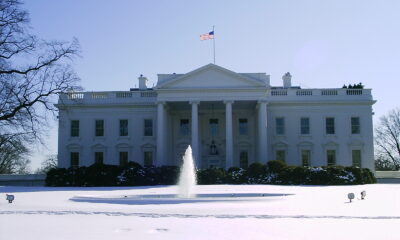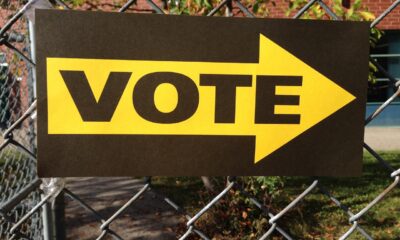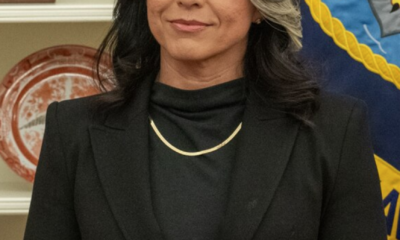Civilization
West Virginia firing a preemptive shot?
Ten West Virginia legislators introduced a concurrent resolution to refuse recognition to any illegitimate Presidential election winner.
Last month, then again last week, CNAV suggested that if Kamala Harris wins the Election of 2024, conservatives would propose resolutions of secession. CNAV further suggested that a multi-state secession movement would begin in Texas, with the Texas Nationalist Movement pushing for it. Yesterday came a word most people missed, concerned as they were with Hurricane Milton, then barreling for Tampa Bay. They would have done well to pay attention. Members of the Republican Caucus of the lower house of the West Virginia legislature introduced a concurrent resolution threatening not to recognize the election of any Democrat if certain kind of skulduggery – or violence – played a role in Donald J. Trump’s defeat. Furthermore, it calls on the Governor of West Virginia to call the legislature into special session in that event.
The West Virginia resolution
Josh Dunlap broke the story on Platform X:
Also, Jim Hoft at The Gateway Pundit published the text of the resolution, and the link to Josh Dunlap’s post. The text of House Concurrent Resolution 203 is available at this link. Actually ten Delegates introduced the resolution last Sunday.
Requesting that the West Virginia Legislature shall not recognize an illegitimate presidential election.
Whereas, a Constitutionally valid government only exists and endures when elections are conducted in accordance with all applicable legal requirements and are free of violence or threats of violence, government manipulation, censorship, coercion, fraudulent voting, or manipulation of votes, election tabulation, and/or election results by any means whatsoever; and that
Whereas, in the 2024 election cycle there have been, to date, two assassination attempts on the Republican nominee for President of the United States while threats of assassination of the Republican nominees for president and vice president abound. The federal government, under the current Democrat-led regime, has utterly failed, and continues to fail, in a suspicious manner, in its absolute duty to adequately protect the Republican nominee for president; and that
Whereas, the Constitutions of the United States and the State of West Virginia require that only legal citizens may vote in U.S. and West Virginia elections, and that there is abundant evidence that non-citizens have been and are being registered to vote in the national election of 2024; therefore, be it
Resolved by the Legislature of West Virginia:
That, the sovereign State of West Virginia declares it will not recognize an election for President if such election is enabled by illegal or fraudulent acts; and be it
Further Resolved, That, the State of West Virginia will not recognize any election of the Democrat candidate for President during the 2024 election cycle if the Republican presidential or vice-presidential candidate is assassinated, seriously injured during an assassination attempt, incarcerated, de facto eliminated or barred from the ballot in any states, or is the subject of legal actions that preclude their effective campaigning; and be it
Further Resolved, That, the State of West Virginia will not recognize an election of a candidate for President during the 2024 election cycle if the Attorney General of West Virginia or the Secretary of State of West Virginia, in consultation with the West Virginia Legislature, determine that election fraud in any state was a major reason that resulted in a candidate for President obtaining a majority in the Electoral College. Election fraud includes non-citizen voting, vote buying, ballot forgery, illegal or illicit ballot harvesting, illegal or illicit discarding of legal votes or voter registrations, ballot miscounts, algorithmic manipulation of votes or vote tabulations, cyber-attack or manipulation, or intimidation. Election fraud also includes interference by any government entities, including arrests or prosecutions for apparent political motives, or other forms of persecution using legal or official processes, to negatively affect an electoral process, or a political entity participating in an electoral process, using unconstitutional, extraconstitutional, illegal, or otherwise illegitimate means, including those under the color of law or office; and be it
Further Resolved, That, the State of West Virginia will not recognize an election of a candidate for President, if the Attorney General of West Virginia or the Secretary of State of West Virginia, in consultation with the West Virginia Legislature, determine that election interference by the federal government, foreign governments, or other state governments was a key factor that resulted in a candidate for President obtaining a majority in the Electoral College. Election interference includes censorship, information suppression or manipulation, or other unconstitutional, extraconstitutional, illegal, or otherwise illegitimate actions by the federal government, foreign governments, or other state governments, either directly or in collusion with elements of the media, social media entities, information entities, or political entities; and be it
Further Resolved, Thereupon a determination by the Legislature of West Virginia, in consultation with the Attorney General and Secretary of State, of either the illegal or illicit elimination of the Republican presidential or vice presidential candidate during the 2024 election cycle; or election fraud or election interference resulting in the Constitutionally illegitimate selection of a President during the 2024 election cycle, the Legislature will be called into special session by the Governor to consider actions to preserve the Freedom of our People. [And be it]
Further Resolved, That the Clerk of the House forward a copy of this resolution to the Attorney General of the State of West Virginia, the Secretary of State of West Virginia, and the Governor of West Virginia; and, be it
Further Resolved, That the Clerk of the House forward a copy of this resolution to the United States Congress.
Television Station WTRF-TV (Channel 7, CBS-TV, Wheeling, West Virginia) also reported on the resolution. They, too, noticed the resolution’s call for a special session of the legislature if Kamala Harris wins by illicit means. But author Kelli McAlhany gave that call a bare mention, and swiftly moved onto another subject.
This is the most provocative proposal for a State legislative resolution since the resolutions of secession that precipitated the War Between the States. The irony that West Virginia, a State carved out of the territory of a seceded State, should consider a precursor to a resolution of secession, seems lost on virtually everyone. Even Jim Hoft seems to notice only that ten Republican Delegates called on their State to refuse recognition to Harris. Secession seems not to have occurred to him. Nevertheless, “actions to preserve the Freedom of our People” cannot fail to signify secession, or at least include it.
Detailed reasons to refuse recognition
The West Virginia Ten (for lack of a better name) list a litany of causes to suspect a manipulated election:
- Violence, or the threat of violence,
- Government manipulation (which they do not define),
- Censorship,
- Coercion (including coercion to vote a certain way, or to certify an election without sufficient assurance of freedom and fairness),
- Fraudulent voting (including non-citizen voting, as well as votes of dead or moved-out voters, or illegal “proxy voting”), and
- Manipulation of votes, election tabulation, and/or election results. Activist David Clements discussed such manipulation in his documentary, Let My People Go (reviewed here).
Then it mentioned the assassination attempts against Trump in July and September, the failure of the Secret Service to protect Trump properly, and the demonstrable presence of noncitizens on several State voter rolls. After this come the first paragraphs: that West Virginia not recognize any winner who won by illegal or fraudulent acts, or if either Trump or Vance suffers assassination, serious injury, incarceration, or de facto exclusion from a ballot. West Virginia would also refuse to recognize the winner if the opponent could not campaign effectively. Next comes a list of offenses that would constitute election fraud, including everything that has concerned election-integrity activists.
In subsequent paragraphs, the resolution lists everything that has happened to Trump in this election cycle, as reasons to refuse recognition of the winner on the grounds of election interference.
A procedure that could lead West Virginia to secede
Most notably, the resolution calls for the Attorney General of West Virginia, or its Secretary of State, in consultation with the Legislature, to determine whether illegal or fraudulent acts decided the election. If the answer is Yes, the Governor must then call a special session of the Legislature. The purpose: “to consider actions to preserve the freedom of our people.” No one is saying what “actions” they would want the legislature to take. These could begin with preemptive nullification of certain mandates the legislature could anticipate a President Harris enacting by executive order. Said mandates could include confiscation of weapons, regulating household appliances off the market, a new push of the Title IX regulations intended to privilege male-to-female “transitioners” to play in women’s sports, and a host of other proposals that have come out of the Biden-Harris administration.
But those actions could also include a resolution of secession. Once again, this is the most provocative resolution anyone has introduced since the South Carolina secession resolution, following the election of Abraham Lincoln.
Reaction to Josh Dunlap’s post was swift and, for the most part, positive. But one person mentioned the case of Texas v. Pennsylvania in 2021. The U.S. Supreme Court refused the case on the grounds of lack of standing. But most other users, reacting to the post, suggested that every State pass similar resolutions.
Analysis
In fact, the Constitution does empower the States to decide how they will appoint Presidential electors. Tellingly, this resolution did not specify overriding West Virginia’s popular vote to seat a pro-Trump delegation of Presidential electors. It deals only with whether other States permit fraud – or violence – to “carry” them.
Nor does this resolution mention the National Popular Vote Compact. However, the reference to “other unconstitutional [or] extraconstitutional… actions by… other State governments” could cover this, too. That Compact, quite simply, violates Article I Section 10 Clause 3, which reads in relevant part:
No State shall, without the consent of the Congress,… enter into any agreement or compact with another State…
Thus far the West Virginia House of Delegates has taken no action beyond referring the resolution to its Judiciary Committee. But if it passes, then perhaps West Virginia, not Texas, will lead the way to secession – and perhaps a Second War Between the States – if Donald Trump loses this election. Donald Trump now has tremendous momentum, especially after the obvious leadership failure in North Carolina after Hurricane Helene. A sudden reversal of electoral fortune might be quite enough to trigger this resolution.
Terry A. Hurlbut has been a student of politics, philosophy, and science for more than 35 years. He is a graduate of Yale College and has served as a physician-level laboratory administrator in a 250-bed community hospital. He also is a serious student of the Bible, is conversant in its two primary original languages, and has followed the creation-science movement closely since 1993.
-

 Accountability2 days ago
Accountability2 days agoWaste of the Day: Principal Bought Lobster with School Funds
-

 Constitution2 days ago
Constitution2 days agoTrump, Canada, and the Constitutional Problem Beneath the Bridge
-

 Executive20 hours ago
Executive20 hours agoHow Relaxed COVID-Era Rules Fueled Minnesota’s Biggest Scam
-

 Civilization20 hours ago
Civilization20 hours agoThe End of Purple States and Competitive Districts
-

 Civilization4 days ago
Civilization4 days agoThe devil is in the details
-

 Civilization3 days ago
Civilization3 days agoThe Conundrum of President Donald J. Trump
-

 Executive4 days ago
Executive4 days agoTwo New Books Bash Covid Failures
-

 Executive4 days ago
Executive4 days agoThe Israeli Lesson Democrats Ignore at Their Peril










